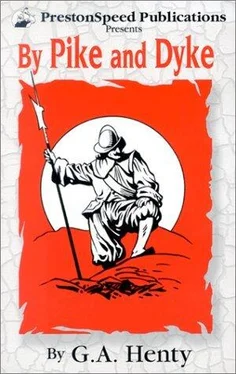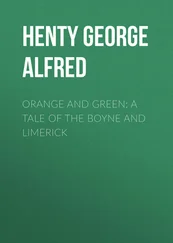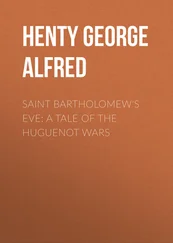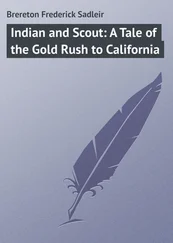G.A. Henty - By Pike and Dyke - A Tale of the Rise of the Dutch Republic
Здесь есть возможность читать онлайн «G.A. Henty - By Pike and Dyke - A Tale of the Rise of the Dutch Republic» весь текст электронной книги совершенно бесплатно (целиком полную версию без сокращений). В некоторых случаях можно слушать аудио, скачать через торрент в формате fb2 и присутствует краткое содержание. Жанр: Старинная литература, на английском языке. Описание произведения, (предисловие) а так же отзывы посетителей доступны на портале библиотеки ЛибКат.
- Название:By Pike and Dyke: A Tale of the Rise of the Dutch Republic
- Автор:
- Жанр:
- Год:неизвестен
- ISBN:нет данных
- Рейтинг книги:5 / 5. Голосов: 1
-
Избранное:Добавить в избранное
- Отзывы:
-
Ваша оценка:
- 100
- 1
- 2
- 3
- 4
- 5
By Pike and Dyke: A Tale of the Rise of the Dutch Republic: краткое содержание, описание и аннотация
Предлагаем к чтению аннотацию, описание, краткое содержание или предисловие (зависит от того, что написал сам автор книги «By Pike and Dyke: A Tale of the Rise of the Dutch Republic»). Если вы не нашли необходимую информацию о книге — напишите в комментариях, мы постараемся отыскать её.
By Pike and Dyke: A Tale of the Rise of the Dutch Republic — читать онлайн бесплатно полную книгу (весь текст) целиком
Ниже представлен текст книги, разбитый по страницам. Система сохранения места последней прочитанной страницы, позволяет с удобством читать онлайн бесплатно книгу «By Pike and Dyke: A Tale of the Rise of the Dutch Republic», без необходимости каждый раз заново искать на чём Вы остановились. Поставьте закладку, и сможете в любой момент перейти на страницу, на которой закончили чтение.
Интервал:
Закладка:
Thus they had retreated at the very moment that the fall of the wall sapped by the flood laid bare a whole side of the city for their entrance. They heard the crash in the darkness, and it but added to their fears, for they thought that the citizens were sallying out to take some measures which would further add to the height of the flood. Their retreat was discovered by the boy, who, having noticed the procession of lights in the darkness, became convinced that the Spaniards had retired, and persuaded the magistrates to allow him to make his way out to the fort to reconnoitre. As soon as the truth was known the fleet advanced, passed the fort, and drew up alongside the quays.
These were lined by the famishing people, every man, woman, and child having strength to stand having come out to greet their deliverers. Bread was thrown from all the vessels among the crowd as they came up, and many died from too eagerly devouring the food after their long fast. Then the admiral stepped ashore, followed by the whole of those on board the ships. Magistrates and citizens, sailors and soldiers, women and children, all repaired to the great church and returned thanks to God for the deliverance of the city. The work of distributing food and relieving the sick was then undertaken. The next day the prince, in defiance of the urgent entreaties of his friends, who were afraid of the effects of the pestilential air of the city upon his constitution enfeebled by sickness, repaired to the town.
Shortly afterwards, with the advice of the States, he granted the city as a reward for its suffering a ten days' annual fair, without tolls or taxes, and it was further resolved that a university should, as a manifestation of the gratitude of the people of Holland, be established within its walls. The fiction of the authority of Philip was still maintained, and the charter granted to the university was, under the circumstances, a wonderful production. It was drawn up in the name of the king, and he was gravely made to establish the university as a reward to Leyden for rebellion against himself.
“Considering,” it said, “that during these present wearisome wars within our provinces of Holland and Zeeland, all good instruction of youth in the sciences and literary arts is likely to come into entire oblivion; considering the difference of religion; considering that we are inclined to gratify our city of Leyden, with its burghers, on account of the heavy burden sustained by them during this war with such faithfulness, we have resolved — after ripely deliberating with our dear cousin William Prince of Orange, stadtholder — to erect a free public school, and university,” &c. So ran the document establishing this famous university, all needful regulations for its government being intrusted by Philip to his above mentioned dear cousin of Orange.
Ned Martin was not one of those who entered Leyden with Boisot's relieving fleet. His long watching and anxiety by the bedside of the prince had told upon him, and he felt strangely unlike himself when he started with the fleet. So long as it was fighting its way forward the excitement kept him up; but the long delay near the village of Aa, and the deep despondency caused by the probable failure of their hopes of rescuing the starving city, again brought on an attack of the fever that had already seized him before starting, and when the Prince of Orange paid his visit to the fleet Boisot told him the young officer he had recommended to him was down with fever, which was, he believed, similar to that from which the prince himself was but just recovering.
The prince at once ordered him to be carried on board his own galley, and took him with him back to Delft. Here he lay for a month completely prostrated. The prince several times visited him personally, and, as soon as he became in some degree convalescent, said to him:
“I think we have taxed you too severely, and have worked you in proportion to your zeal rather than to your strength. The surgeon says that you must have rest for awhile, and that it will be well for you to get away from our marshes for a time. For two years you have done good and faithful service, and even had it not been for this fever you would have a right to rest, and I think that your native air is best for you at present. With the letters that came to me from Flushing this morning is one from your good father, asking for news of you. His ship arrived there yesterday, and he has heard from one of those who were with Boisot that you have fallen ill; therefore, if it be to your liking, I will send you in one of my galleys to Flushing.”
“I thank your excellency much,” Ned said. “Indeed for the last few days I have been thinking much of home and longing to be back. I fear that I shall be a long time before I shall be fit for hard work again here.” “You will feel a different man when you have been a few hours at sea,” the prince said kindly. “I hope to see you with me again some day. There are many of your countrymen, who, like yourself, have volunteered in our ranks and served us well without pay or reward, but none of them have rendered better service than you have done. And now farewell. I will order a galley to be got in readiness at once. I leave myself for Leyden in half an hour. Take this, my young friend, in remembrance of the Prince of Orange; and I trust that you may live to hand it down to your descendants as a proof that I appreciated your good services on behalf of a people struggling to be free.
So saying he took off his watch and laid it on the table by Ned's bedside, pressed the lad's hand, and retired. He felt it really a sacrifice to allow this young Englishman to depart. He had for years been a lonely man, with few confidants and no domestic pleasures. He lived in an atmosphere of trouble, doubt, and suspicion. He had struggled alone against the might of Philip, the apathy of the western provinces, the coldness and often treachery of the nobles, the jealousies and niggardliness of the Estates, representing cities each of which thought rather of itself and its privileges than of the general good; and the company of this young Englishman, with his frank utterances, his readiness to work at all times, and his freedom from all ambitions or self interested designs, had been a pleasure and relief to him, and he frequently talked to him far more freely than even to his most trusted counsellors.
Ever since the relief of Alkmaar Ned had been constantly with him, save when despatched on missions to various towns, or to see that the naval preparations were being pushed on with all speed; and his illness had made a real blank in his little circle. However, the doctors had spoken strongly as to the necessity for Ned's getting away from the damp atmosphere of the half submerged land, and he at once decided to send him back to England, and seized the opportunity directly the receipt of Captain Martin's letter informed him that the ship was at Flushing.
An hour later four men entered with a litter; the servants had already packed Ned's mails, and he was carried down and placed on board one of the prince's vessels. They rowed down into the Maas, and then hoisting sail proceeded down the river, kept outside the island to Walcheren, and then up the estuary of the Scheldt to Flushing. It was early morning when they arrived in port. Ned was carried upon deck, and soon made out the Good Venture lying a quarter of a mile away. He was at once placed in the boat and rowed alongside. An exclamation from Peters, as he looked over the side and saw Ned lying in the stern of the boat, called Captain Martin out from his cabin.
“Why, Ned, my dear boy!” he exclaimed, as he looked over the side; “you seem in grievous state indeed.”
“There is not much the matter with me, father. I have had fever, but am getting over it, and it will need but a day or two at sea to put me on my feet again. I have done with the war at present, and the prince has been good enough to send me in one of his own galleys to you.”
Читать дальшеИнтервал:
Закладка:
Похожие книги на «By Pike and Dyke: A Tale of the Rise of the Dutch Republic»
Представляем Вашему вниманию похожие книги на «By Pike and Dyke: A Tale of the Rise of the Dutch Republic» списком для выбора. Мы отобрали схожую по названию и смыслу литературу в надежде предоставить читателям больше вариантов отыскать новые, интересные, ещё непрочитанные произведения.
Обсуждение, отзывы о книге «By Pike and Dyke: A Tale of the Rise of the Dutch Republic» и просто собственные мнения читателей. Оставьте ваши комментарии, напишите, что Вы думаете о произведении, его смысле или главных героях. Укажите что конкретно понравилось, а что нет, и почему Вы так считаете.












